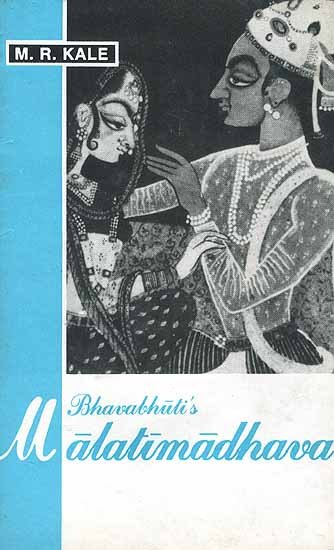Malatimadhava (study)
by Jintu Moni Dutta | 2017 | 52,468 words | ISBN-10: 8120813057 | ISBN-13: 9788120813052
This page relates ‘Madhurya Guna (sweetness)’ from the English study on the Malatimadhava of Bhavabhuti:—A Prakarana type of Drama in ten acts revolving around the love-story of Malati (from Padmāvatī) and Madhava (from Vidarbha). This study discusses the history of its author and the literary, social, religious, historical and cultural aspects of the Malatimadhava.
Part 4.3a - Mādhurya Guṇa (sweetness)
Bharata opines that, it is Mādhurya guṇa i.e. sweetness when a sentence is heard or repeated many times does not make bore.[1] According to Mammaṭabhaṭṭa, the Mādhurya guṇa is the source of delight and the cause of melting in case of erotic sentiment.[2] Viśvanātha opines that in the case of the sentiments like Sambhoga śṛṅgāra, Karuṇa, Vipralambha śṛṅgāra and Śānta, Mādhurya guṇa presents in an excessive degree.[3] According to Bhāmaha, the Mādhurya of kāvya consists in its being pleasing to the ear and in the use of a smaller number of compounds.[7] The suggestive of this excellence are the sparśa (mute) consonants, with the exception of those of the ṭa group, combined with the last consonant of their group, the consonants ra and ṇa when short, expression free compounds, compounds of medium length and harmonious diction. All the consonants from k to m except ṭa, ṭha, ḍa and ḍha combined with the last letter of their respective groups are suggestive of sweetness.[8]
Bhavabhūti uses this quality in all the acts. The Mādhurya guṇa is used in delineating the sentiments like Śṛṅgāra, Karuṇa and Śānta. The predominent sentiment of Mālatīmādhava is Śṛṅgāra. This guṇa found in both the varieties of Śṛṅgāra rasa are presented here——
(i) Mādhurya Guṇa in Sambhoga Śṛṅgāra Rasa:
In the Mālatīmādhava, the poet has appropriately made the use of Mādhurya guṇa (sweetness) in Sambhoga śṛṅgāra rasa while describing the longing of Mādhava for Mālatī. As for instance in the verse yadvismayasti mitamastamitānyabhāva..............etc[4] wherein the sparśa or mute consonants with the exception of those of the ṭa group, combined with the last consonants of their group is found. Here, compounds are of medium length and the letters such as ṭa, ṭha, ḍa, ḍha do not exist. Hence, this verse is a suitable example of sweetness.
(ii) Mādhurya Guṇa in Vipralambha Śṛṅgāra Rasa:
Bhavabhūti seems to be very keen in using Mādhurya guṇa in Vipralambha śṛṅgāra rasa while describing the longing of Mādhava. For instance in the verse naveṣu lodhraprasaveṣu kāntirdṛśaḥ...........etc[5] compounds of medium length or the words of free compounds are revealed on account of which the verse is an example of Mādhurya guṇa (sweetness).
(iii) Mādhurya Guṇa in Karuṇa Rasa:
Bhavabhūti has very deliberately used Mādhurya guṇa in Karuṇa rasa in the Mālatīmādhava. For instance in the verse mātarmātardalati hṛdyaṃ dhvaṃsate dehavandhaḥ..................etc.[6] letters such as ṭa, ṭha, ḍa, ḍha do not exist, compounds of medium length are found and sparśa consonants combined with their last letter are present. Hence this verse is an example of Mādhurya guṇa (sweetness).
Footnotes and references:
[1]:
vahuśo yacchrutaṃ vākyamuktaṃ vāpi punaḥ punaḥ/
nodvejati yasmādhvi tanmādhurjyamiti smṛtam //
Nāṭyaśāstra, XVI.104
[3]:
saṃbhoge karuṇe vipralambhe śānte’dhikam kramāt /
Sāhityadarpaṇa,VIII.2
[4]:
yadvismayastimitamastamitānyabhāva /
mānandamandamamṛtaplavanādivābhūt /
tatsannidho tadadhunā hṛayaṃ madīya /
maṅgāracumbitamiva vyathamānamāste //
Mālatīmādhava,I.19
[5]:
[6]:
[7]:
Kāvyālaṃkāra,II.1
